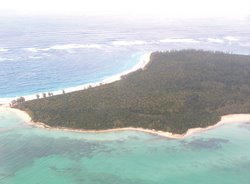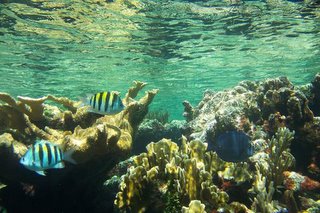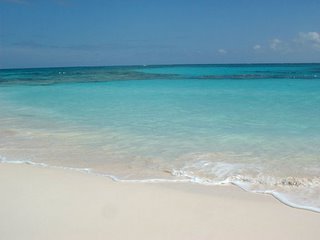For decades, Bahamian government officials have been announcing new agreements – almost monthly – with foreign investors to develop another piece of their paradise islands. And, with over 90% of the 700 islands and 2400 cays in the archipelago of The Bahamas still virtually uninhabited, there seemed no end to this trend. But that all changed earlier this year when a small group of Bahamian environmentalists threw cold water on this fire sale of government land.
 The controversial Guana Cay: Ideally suited for a $500 million investment or sacred land not available for exploitation at any price?
The controversial Guana Cay: Ideally suited for a $500 million investment or sacred land not available for exploitation at any price?
Last month, emulating the spirit of the little engine that could, a relatively powerless group called the Save Guana Cay Reef Association (the “locals”) won a temporary injunction against the government’s sale of Great Guana Cay. The locals considered it a betrayal of national trust for the government to sell this 1100-acre Cay which is comprised of lush mangroves, a fish estuary, wetlands and the most beautiful beaches known to man – all situated a sea shell’s toss from the ecologically significant Great Abaco Barrier Reef (the third largest in the world).
To say that Bahamian Prime Minister Perry Christie was blind-sided by this injunction would be a terrific understatement. After all, it was issued less than 2 weeks after he signed a pro forma Heads of Agreement (“the Agreement”) with the Discovery Land Passerine Developers for a $500 million investment in Guana Cay – featuring a first-rate golf course, 240-slip marina and over 350 residential units. But natives all over the Caribbean should take heart that the Court not only recognised the right of the locals to challenge the Agreement but also validated their claims by granting the injunction pending judicial review.
Through their attorney, Mr. Frederick Smith, the locals argued that their claims have procedural, equitable and environmental merit:
Procedurally, they claim that PM Christie failed to follow established protocol for the sale of Crown Lands and that he signed the Agreement with the Passerine Developers in an arbitrary and capricious manner – without proper authorization. Specifically, the locals charge that:
…there was complete failure of consultation; moreover, that the Prime Minister’s office deliberately discouraged public comment prior to executing the Agreement; and that this was unlawful.
Equitably, and more persuasively, they claim that the Agreement should be rescinded because it provides for the sale of Crown Lands without any expectation of benefit or enrichment for the Bahamian people. Specifically, the locals charge that:
…the Agreement does not require local participation in the ownership or management of the development; it does not require the use of locals in construction or the provision of professional or unskilled services; the developers are exempt from paying taxes on the billions of anticipated profit; and, that they have no legal obligation to ensure that their project contributes – not even collaterally – to the sustainable development of the Bahamas.
 The deal? These beautiful waters in exchange for dredged-up parking slips for boats belching fuel and condos discharging refuse…
The deal? These beautiful waters in exchange for dredged-up parking slips for boats belching fuel and condos discharging refuse…
Environmentally, the claim that, notwithstanding assurances from the government’s economic impact assessment (EIA), the Agreement should be rescinded because dredging for the slip marina alone will cause untenable aesthetic scarring to the area’s ecosystem. Specifically, the locals charge that:
…this development poses irreparable harm, is simply not sustainable and, therefore, should not proceed no matter what environmental safeguards the Passerine Developers propose.
Nevertheless, though significant, these hard won battles are no guarantee that the locals will win the war to decide the fate of Guana Cay. Indeed, their best hope is for the Supreme Court to declare parts of the Agreement voidable and unenforceable (as against the public interest) and order PM Christie and the Passerine Developers to amend it to redress some of their concerns.
But all Caribbean natives should applaud these Bahamian locals for requiring their government officials to demonstrate a rational basis and national purpose for the sale of government land. And such local vigilance is critical where development impacts rich ecosystems like the Great Abaco Barrier Reef.
The Bahamas is a relatively rich nation and has no fiscal need to trade its natural heritage for easy cash; especially with so many islands and cays available for sale that would pose far less threat to sensitive ecosystems. But most Caribbean nations are blessed with natural wonders that are the envy of the world, and they too must balance social and environmental concerns with the financial windfall that comes from developing these precious areas. Therefore, it behooves all of us to heed the example set by the locals of Guana Cay to ensure that we are honoring our duty to cherish and protect these natural gifts from God.
Prime Minister Christie and his government might win the legal right – but they have no moral right – to sell this land.
Therefore, click here for more information on the Save Guana Cay Reef Association and to register your support for their efforts to protect these natural treasures.
 Beautiful Caribbean beaches like this one are the least of what the locals of Guana Cay are fighting for…
Beautiful Caribbean beaches like this one are the least of what the locals of Guana Cay are fighting for…
News and Politics
Leave a Reply
You must be logged in to post a comment.